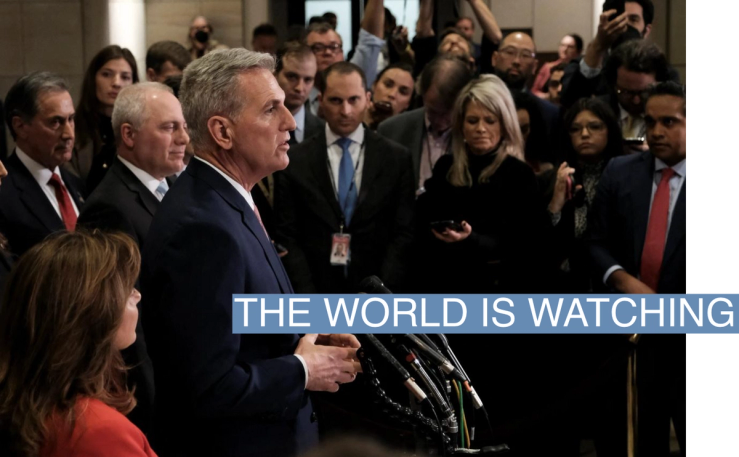The News

It’s official: Democrats held the Senate, Republicans took Congress. It’s not just Americans watching the results, though. The narrow Republican takeover could have a major impact on foreign policy and sets up likely clashes with the White House — and within the GOP — on key issues.
UKRAINE
Support for Ukraine has always been bipartisan, but a divide within the Republican Party over assistance for Kyiv could complicate the path forward for any future funding and lead to beefed-up oversight of the funds.
The White House looks like it may avoid a funding fight, though – at least until the end of next fiscal year. The administration is asking Congress to approve $37.7 billion security and other assistance for Ukraine as part of a must-pass omnibus spending package lawmakers hope to approve in the lame duck before a Dec. 16 deadline.
Ultimately, it will be up to Democrats in the House and Senate to decide on the final dollar number to attach to an omnibus spending package, which would need Republican votes in the Senate – where support for Ukraine assistance is more solid among Republicans.
“You’ve got to keep the lights on. These people are fighting for their freedom, they’ve been victims of the worst war crimes since Nazi Germany and now is not the time to bail out on them,” Sen. Lindsey Graham, R-S.C. told a group of reporters Wednesday afternoon.
House Republican leaders are signaling they will tighten oversight of money that is flowing to Ukraine, even as some prominent members have questioned whether it should be going out at all.
House Minority Leader Kevin McCarthy, R-Calif., who is expected to take the speaker’s gavel, sought to project support for Ukraine in a recent interview with CNN but said there must be “accountability going forward.”
The expected leaders of House panels with oversight of Ukraine funds – the Foreign Affairs, Armed Services and Intelligence committees – have all been vocal supporters of Ukraine.
Still, a contingent of more isolationist members have opposed funding for Ukraine. For instance, Rep. Marjorie Taylor Greene, R-Ga. has argued the U.S. should spend the money on domestic issues like border security rather than Ukraine and called for an audit of funds sent to Ukraine.
“We want to audit Ukraine and that needs to happen. We voted no to send money over there, but we also are going to audit what’s happening over in Ukraine,” Greene told reporters Thursday as she introduced a resolution calling for an audit of funding to Ukraine.
CHINA
House Republicans have already sketched out plans for a hawkish China policy, some of which may overlap with Democratic plans.
They intend to dig into a broad swath of issues, from consensus topics like human rights and Taiwan policy to more partisan issues like the origins of COVID-19 and Hunter Biden’s business dealings in China.
McCarthy intends to set up a new select committee to look at China. Rep. Michael McCaul, R-Texas, who is expected to lead the Foreign Affairs panel, is also launching a 90-day review of the Bureau of Industry and Security within the Commerce Department, which rolls out export controls targeting China, Russia and other countries for the purpose of national security.
There’s an appetite among lawmakers across the political aisle to be perceived as tough on China, which could mean some bipartisan cooperation on, say, legislation that aims to penalize China for human rights abuses or express support for Taiwan.
An annual defense policy bill expected to pass during the lame-duck session would authorize billions more in defense aid for Taiwan.
“I think it’s probably the area where you really will see least change, in that standing up to China still enjoys quite strong bipartisan support,” said Charles Kupchan, who served at the National Security Council under former President Obama. “The last presidential election, Biden and [former President] Trump were trying to outdo each other about who’s tough on China.”
Republicans are much less likely to attract Democratic support, however, for efforts that seek to punish China over the emergence of the coronavirus. The White House and House Republicans are already tangling over the House Oversight Committee’s efforts to probe Hunter Biden’s overseas business dealings.
“Instead of working with President Biden to address issues important to the American people, like lower costs, congressional Republicans’ top priority is to go after President Biden with politically-motivated attacks chock full of long-debunked conspiracy theories,” Ian Sams, a spokesman for the White House counsel’s office, said Thursday following a news conference in which House Republicans laid out an inquiry into business dealings of the president’s family.
AFGHANISTAN
The House Foreign Affairs Committee is gearing up for a sprawling investigation of the U.S. withdrawal from Afghanistan.
Wielding subpoena power in the majority, Republicans will have the power to haul officials to Capitol Hill for testimony and force production of documents.
McCaul has already sent a letter to the State Department demanding officials preserve documents related to requests that he said committee Republicans did not receive adequate responses to as part of a prior investigation in the minority.
“We plan to hit the ground running based on that previous paper trail,” said a House Foreign Affairs Committee Republican staff member. Another staffer accused the administration of obstructing congressional oversight of Afghanistan.
Aides predicted the investigation would involve transcribed interviews behind closed doors as well as public testimony and that other committees would also play investigative roles.
The Foreign Affairs panel wants to delve into what went wrong leading up to and during the withdrawal, according to staff, while also examining the aftermath – including the Afghan refugee relocation process and the impact on women and girls in Afghanistan.
“We engage Congress regularly, on a number of issues, including Afghanistan - on which we’ve responded to hundreds of requests,” a State Dept spokesperson told Semafor. “Our Congressional engagements broadly take place with Members, with Minority staff, with Majority staff — and those engagements will continue regardless of composition of the next Congress.”
INTERNATIONAL MARKETS
Divided government in Washington will likely mean less government spending and few major policy changes, which could make some investors happy.
But Republicans may also try to use votes on the debt ceiling to force other spending cuts, potentially setting up a showdown that could rattle financial markets at a time of financial instability. If the U.S. were to voluntarily default on its obligations, it could prompt analysts to downgrade its debt and send interest rates soaring, with implications far beyond its own borders.
So far, Democratic leaders have not signaled plans to take unilateral action on the debt ceiling during the lame duck, which would avert a fight in the next Congress, nor have Republicans shown interest in passing a bipartisan deal to defuse the issue.
The next Congress will also take over as some financial analysts are predicting a recession. With Republicans in charge in the House, passing additional financial support if the economy contracts and unemployment spikes could be more difficult.
“Markets should be able to look past some of the fiscal fights as we’ve all seen the debt ceiling and government double feature before, but an underappreciated dynamic will be Washington’s disinterest in fiscal support measures if we do see an economic downturn next year,” Isaac Boltansky, an analyst at the financial services firm BTIG, recently told Semafor. “The market is not going to be able to count on Washington using its traditional tools to battle the next recession.”
In this article:
Morgan’s view
The biggest international tension points for the administration and the new Congress will be over Ukraine and oversight investigations that touch on national security issues. The president has wide latitude to set the nation’s foreign policy, and the executive branch won’t really be hampered unless it involves appropriations or investigative maneuvers.
There are also reasons for the White House to feel relieved at the outcome. Democrats retained the Senate majority, meaning that the administration will not face the same onslaught of investigations – into Afghanistan or otherwise – from the upper chamber. Biden also won’t run into trouble confirming nominees for critical foreign policy roles.
Room for Disagreement
The White House said that the midterm results – in which Democrats overperformed expectations – strengthened Biden’s position on the world stage when he traveled overseas for meetings with world leaders.
White House national security adviser Jake Sullivan told reporters over the weekend that news that Democrats kept control of the Senate came up in several conversations between Biden and other leaders at the East Asia Summit in Cambodia.
“I would say one theme that emerged over the course of the two days was the theme about the strength of American democracy and what this election said about American democracy,” Sullivan said aboard Air Force One.
The White House has dismissed talk of waning support among Republicans for Ukraine, Sullivan recently predicting at a Council on Foreign Relations event that those who question Ukraine assistance would remain a “very distinct minority.”
A Ukrainian lawmaker also recently told me they were not concerned about the prospect of a Republican-controlled Congress that is less willing to help Ukraine, noting the bipartisan support historically for the country.

